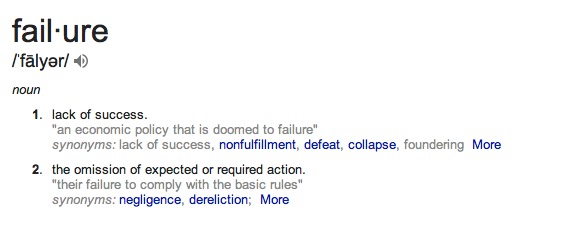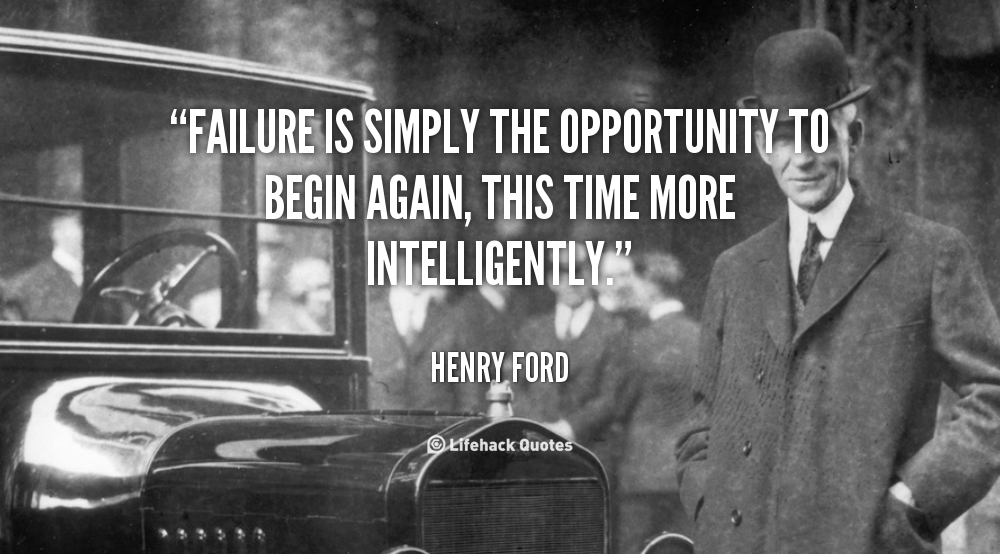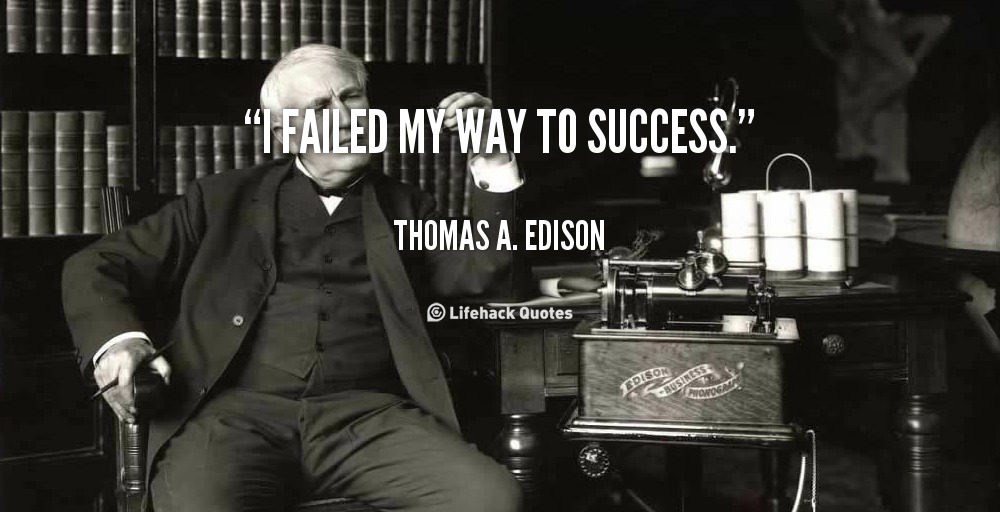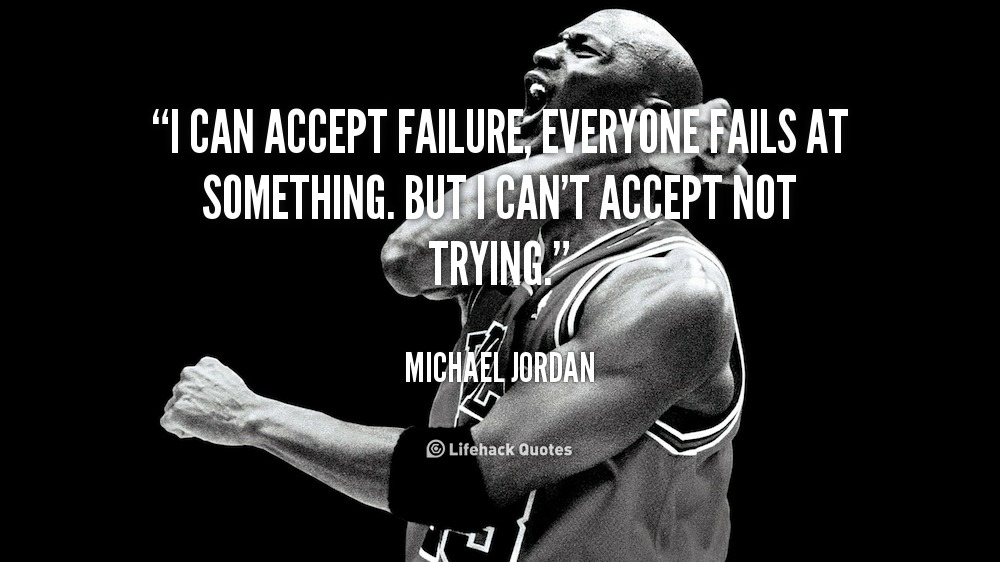As I’m writing this post, it’s the December Solstice—literally the darkest night of the year. Add to that the looming end of year, holiday stress, and all those 2016 resolutions that fell by the wayside. That adds up to a rocky road thru the end of December. This time of year is often introspective, and it’s often the time of year we can be hardest on ourselves. We feel like we haven’t gotten nearly as much done as we wanted to, as we thought we could have, should have achieved. I’ve had shades of this conversation with many people this week, so I thought I’d address it here…
I think it’s time to talk about failure.
Before we begin, let me shout out Greg Manchess’s great 10 Things About…Failure post from a few years ago. Greg called out some of my favorite “failure” quotes, especially from this guy:
I think Greg’s post is fabulous, and really useful in telling us how to deal with failure. But I want to take it one step further. I don’t think failure actually exists. It’s all in our heads. And if it’s all in our heads, then we get to control it. Success and failure are all about the stories we tell ourselves. Success and failure depend entirely on our point of view, and how we decide to judge ourselves.
Sounds crazy, right? We spend so much of our lives afraid of failing. That’s all going to just…disappear? Follow me for a minute here, I have a thought exercise.
What is the definition of failure?
1. Failure is a lack of success.
Ok, well who defines success? In everything that matters, it should be you. Not society, not your boss, not your teachers. Not your family. Not your significant other. Not your peers. You. You should be defining your goals. And, because you are a changing and evolving individual, your goals should be able to change and evolve too. And if your goals are evolving and changing…then you can’t really fail at them. There’s great quotes about there being no failing except giving up. To a degree that’s true, but take it further. I think the only failing is not trying at all. As long as you’re moving forward, no matter how altered the path, you can’t fail.
You can take longer than you expected. You can move the goalposts. You can even change the goal altogether. But you can’t fail. Because you, and only you, define what you consider success.
You also define what you consider the learning process. What’s the difference between failure and just the process of learning? Every time you draw a hand, you get better at it. Does that make every hand you’ve ever drawn before that hand a failure? Of course not. You can get better and better at drawing hands ad infinitum. You can always draw a better hand. Does that mean every hand you will ever draw in the future is a failure? No, we know that’s just part of learning. So as long as you are still learning, there’s no failing.
2. Failure is the omission of expected or required action.
This is even easier to unpack. This part of the definition isn’t about your goals, it’s about goals given to you by external sources. And while, yes, we live in the world, and we have to fulfill certain expectations of us by our jobs, by people in our lives, by society, those are all goals that we choose to accept. I don’t think the problem is failing…I think the problem is deadlines…(see below)
Failure vs. Deadlines
Really, the thing to be scared of isn’t failure, it’s deadlines. Because you can bite off more than you can chew in the amount of time you give yourself. You can overestimate what you can accomplish. You can get well onto the road to success, and realize it’s a longer road than you expected when you set out. I am definitely guilty of having to alter deadlines often, because things come up and I need to reshuffle priorities…but I don’t consider that failing.
Often times the difference between failure and success is just where you draw the finish line.
Honestly what I often find is that I overestimate my ability to dedicate myself to that one original goal. Other things come up. Sometimes they’re important, great, wonderful things, and you make room for them. Is it a failure to not learn to play the piano because you unexpectedly got the opportunity to apprentice with a violin master and decided to learn that instead (or just to put off learning the piano until later)? I don’t consider that a failure. Your goal evolved as you set out to pursue it in the real world. And hopefully it changed into something better.
Motivation vs. Excuses
I’ve talked about this mindset of “no such thing as failure” with a few people, and the devil’s advocate argument always comes up: if there’s no such thing as failure, then how would you get anything done? I know that the fear of failure does motivate a lot of people, but in my experience, motivation by fear more often leads to freezes, blocks, and forced creativity instead of that golden enjoyable flow that just…works. I think the pressure of not failing is less fruitful than the freedom to choose your own path and pursue your goals without fear.
Of course there’s no real way to quantify this and prove it in a widespread way. We can only prove or disprove it for ourselves. But if you’ve always been a person that feels the threat of failure looming over their shoulder…maybe it’s time to try putting down that burden and seeing if you are just as productive without it. I think the extra energy of not carrying that weight will actually let you get further than you ever have before.
Maybe this year, when you’re looking back at what you didn’t achieve (yet), remember to take into account all the awesomeness you achieved without knowing it was a goal. Maybe look back and instead of naming an incomplete goal a failure you refine it into something better. If you missed a deadline, look back at what you learned about the project and know how to estimate time more accurately next time.
But most of all, be nicer to yourself. The fear and pressure you inflict on yourself might be the very thing holding you back from achieving that goal.












It's like you read my mind. Great Post Lauren- Thanks!
Great Article, Lauren!
Chris Kotsakis
Failure should be taken out of our language. “That didn't work” should be the replacement phrase since it implies that whatever the context is, then there's the possibility of it working with another solution.
Or, even better, “That didn't work YET.”
In the sciences we have a saying… We have no money, therefore we must think… this leads to creative moments for some of us left brained folks…
Thank you Lauren. To see this post in the morning was like a bright light into the yearly december mental low. And it takes so little to snap out of it. Blessings
When things don't turn out—as they often don't—I remember what Walt Disney said: “All the adversity I've had in my life, all my troubles and obstacles, have strengthened me. You may not realize it when it happens, but a kick in the teeth may be the best thing in the world for you.” Great post, Lauren.
Great topic. I just finished reading David McCullough's biography of the Wright Brothers, which followed them through their process of inventing the first powered aircraft. In that field, of course, failure can be not only costly but fatal, as it was for Lilienthal. Orville and Wilbur took risks, but always testing and calculating the dangers as best they could. Failure isn't as costly for artists as it is for race car drivers or astronauts, but I think it still should be minimized through testing, experimenting, and informed risk taking. I think there's a kind of cult of celebrating failure that has become established in creativity circles
(not so much in your post, but in other places) which can be less constructive than focusing more on building success through a process of experimentation.
<3 we're all in the same boat
That's a great quote, thanks Arnie!
Talk about putting things into proper perspective…at least a bad painting isn't fatal!
Thank you for this post. This was one of my lowest years as a creative. I am reading blogs, books and watching videos to spark my energy and this made me pause and smile. Yes. The goals have changed the path is not what I expected. It's going to be ok.
Lauren:
Thank you for this post. It is nice to be reminded of why we do this.
That it is individual for each and every one of us.
Looking forward to 2017.
This post does a great job of highlighting the power of reframing. A powerful tool for reviewing a goal in a more positive light. Asking “was this deadline reasonable?” or “how can I do this differently to get a better result next time?” Those questions have been beneficial for me.
“Reframing” exactly! love that term.